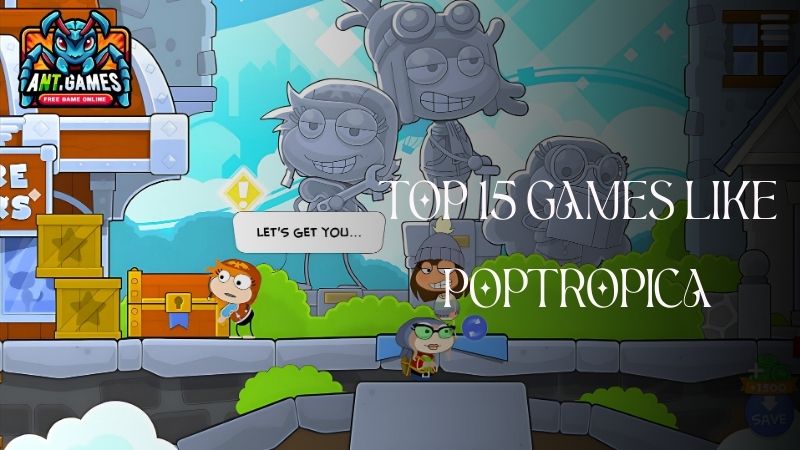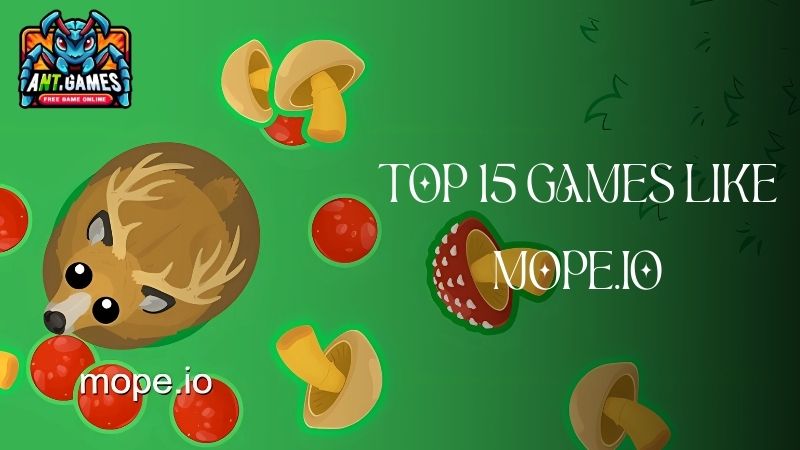An MMORPG (Massively Multiplayer Online Role-Playing Game) is a role-playing video game where thousands—or even millions—of players interact in a shared, persistent online world. These games combine classic RPG elements like character progression, quests, and exploration with large-scale multiplayer gameplay.
One of the biggest draws of MMORPGs is character customization. Players can create unique avatars, shaping their appearance, skills, and abilities. As they begin their journey, teamwork becomes essential. Forming alliances and guilds helps players tackle challenges, defeat powerful enemies, and complete epic quests.
In this article, AntGames will explore MMORPGs in detail. We’ll cover their advantages, how they differ from other game genres, and highlight some of the most popular MMORPGs you should try. Whether you prefer playing solo or teaming up with others, we’ll introduce you to engaging and exciting games that suit your playstyle.
What is an MMORPG?
An MMORPG (Massively Multiplayer Online Role-Playing Game) is a video game where players explore vast virtual worlds alongside thousands of others in real time. These games offer deep customization, character progression, and strategic gameplay in persistent online environments.
MMORPGs emphasize player choice and agency. As players level up and unlock new abilities, they shape their character’s journey. Many games feature player-driven economies, allowing for trading, crafting, and wealth accumulation. The genre revolves around key mechanics like quests, guilds, raids, and PvP (player-versus-player) battles. MMORPGs are a major part of the gaming industry and e-sports scene, offering endless opportunities for adventure and competition.

What are the benefits of playing MMORPGs?
MMORPGs (Massively Multiplayer Online Role-Playing Games) offer numerous advantages as part of benefits of playing games for digital entertainment enthusiasts. These benefits encompass cost-effective gaming experiences, vibrant virtual communities fostering social interaction, flexible and accessible gameplay mechanics, and continuous content updates.
Cost-effective Entertainment
One of the paramount advantages of engaging in Massively Multiplayer Online Role-Playing Games (MMORPGs) on a personal computer is their cost-effectiveness. MMORPGs offer an economical gaming experience with exceptional long-term engagement and player retention.
Your initial investment in an MMORPG yields substantial returns as you immerse yourself in rich, evolving narratives, expansive in-game economies, and persistent online environments. Unlike traditional games with finite storylines that players may complete rapidly, MMORPGs provide hundreds, even thousands of hours of content.
Furthermore, the social aspects of MMORPGs, including guild systems, player-versus-player combat, and cooperative gameplay, enhance the overall value proposition by providing opportunities for meaningful interactions and shared experiences within the gaming community.

Community and Social Interaction
MMORPGs (Massively Multiplayer Online Role-Playing Games) provide a dynamic social ecosystem where players can cultivate enduring relationships and establish thriving virtual communities within expansive digital realms.
Flexibility and Accessibility
Free online MMORPGs provide broad accessibility, allowing players to immerse themselves in virtual worlds without the need for expensive gaming consoles or high-performance computers. The flexibility of these games extends to character customization, quest selection, and social interactions, enabling players to choose from a wide range of avatar archetypes like warriors, rogues, or spellcasters, fostering a rich, cooperative environment.
The worlds in these games are often complex, with detailed lore, evolving narratives, and intricate economies, offering a cognitively engaging experience. Additionally, free MMORPGs use transparent monetization models, where optional microtransactions for cosmetic items or quality-of-life improvements coexist with fully accessible core gameplay.

Constant Updates and New Content
Perpetual evolution and dynamic content updates form the cornerstone of free online Massively Multiplayer Online Role-Playing Games (MMORPGs), fostering player engagement through a continuous stream of enhancements and novel experiences. Game developers meticulously refine gameplay mechanics based on user feedback, ensuring the virtual environment remains vibrant and captivating.
Developer-community synergy plays a crucial role in this iterative process. By actively engaging with the player base and implementing requested features, MMORPG creators cultivate a sense of player agency and investment in the game’s trajectory.
Moreover, the cyclical nature of updates creates a meta-game of anticipation and speculation within the community. Players eagerly await announcements of forthcoming content, fostering discussions and theories that further cement their engagement with the game.
See more: What are fps?
What makes MMORPGs different from other types of games?
The virtual realms of Massively Multiplayer Online Role-Playing Games (MMORPGs) distinguish themselves from conventional single-player games in several pivotal aspects. As one of the most immersive video game genres, MMORPGs offer a persistent, dynamic world that continues to evolve even when players are offline. This ever-changing environment fosters unique game mechanics that heavily rely on player interaction and community engagement.
In fact, MMORPGs facilitate complex social structures, encouraging players to form guilds, alliances, and participate in large-scale events such as raids, player-versus-player (PvP) battles, and in-game economies. These communal experiences are simply not feasible in single-player games. The interconnectedness of MMORPGs transforms gaming from a solitary pursuit into a living, breathing shared adventure.

What are some popular MMORPGs?
While myriad Massively Multiplayer Online Role-Playing Games (MMORPGs) have graced the digital realm, several titles stand out as industry titans that have enthralled millions of players globally. As a significant subgenre of role-playing video games, MMORPGs offer expansive worlds, deep character customization, and social-driven gameplay. Some notable MMORPGs games we have to mention are World of Warcraft, Final Fantasy XIV. For those seeking a vast, open world to traverse, The Elder Scrolls Online brings the epic fantasy domain of Tamriel to life with unparalleled freedom, featuring fully voiced NPCs and a classless character progression system.
Besides, Guild Wars 2 breaks the traditional MMORPG mold with its dynamic events, Black Desert Online caters to action enthusiasts with its fast-paced, combo-driven combat and intricate character customization, complemented by a complex economy and node management system.
Other notable entries in the MMORPG pantheon include:
- EVE Online
- RuneScape
- Star Wars
- Lord of the Rings Online
- Albion Online

What are some common MMORPG terms?
Navigating the MMORPG (Massively Multiplayer Online Role-Playing Game) ecosystem demands fluency in a specialized lexicon of terms and acronyms that players employ for efficient communication.
- Guild: Players frequently encounter guild dynamics, where organized groups form to collaboratively tackle challenges.
- Grinding: Involve repetitive actions to level up or acquire resources.
- Raid: Raid coordination is crucial for large-scale group encounters, necessitating teamwork and meticulous planning.
- PvP (Player versus Player) tactics come into play during inter-player combat, testing combat prowess and strategic acumen.
- Skill tree optimization allows for character customization, maximizing ability effectiveness.
- Endgame: This term is for high-level players, ‘instancing’ for private game areas, and ‘min-maxing’ to perfect character statistics.
- MMORPG: Also encompasses ‘MMO fatigue’, means burnout from excessive play
- Macros: automated action sequences
- Bots: AI-controlled characters
- Power leveling: Rapid character advancement.
Additional terms include ‘aggro‘ (enemy attention), ‘AoE’ (Area of Effect abilities), ‘CC‘ (Crowd Control), ‘DPS‘ (Damage Per Second), ‘tank‘ (damage-absorbing role), and ‘healer‘ (support role).

What can you do in MMORPG?
Beyond generating virtual currency, MMORPGs (Massively Multiplayer Online Role-Playing Games) offer a plethora of immersive activities and experiences that captivate players for innumerable hours.
MMORPGs also feature diverse gameplay elements, including:
- Questing: Narrative-driven missions that advance the game’s storyline and character development.
- Raiding: Coordinated group efforts to defeat powerful bosses and obtain rare loot.
- Exploration: Discovering new areas, hidden secrets, and lore within the game world.
- Housing: Customizing personal or guild spaces within the game.
- Pet and mount systems: Collecting and training companions or mounts for utility and cosmetic purposes.
- Achievement hunting: Completing specific challenges for rewards and recognition.
- Seasonal events: Participating in time-limited activities tied to real-world holidays or in-game celebrations.

Can you make money playing MMORPG?
Many MMORPG (Massively Multiplayer Online Role-Playing Game) enthusiasts have discovered ways to monetize their gaming passion, transforming virtual adventures into tangible financial gains.
Begin by mastering virtual currencies, which you can accumulate through quest completion, daily activities, and seasonal events. Player-to-player trading is another lucrative avenue – employ arbitrage strategies to buy low and sell high, watching your virtual wallet expand exponentially.
Delve into item crafting and production to create valuable gear, consumables, and rare items that other players covet. Moreover, consider streaming your gameplay on platforms like Twitch or YouTube to monetize your audience through subscriptions, donations, and sponsorships.
What are the disadvantages of playing an MMORPG on a computer?
MMORPGs (Massively Multiplayer Online Role-Playing Games) offer immersive virtual worlds but present several significant drawbacks. The addictive nature of these digital realms can consume vast amounts of a player’s time, potentially interfering with real-life responsibilities and interpersonal relationships.
Financial implications can be a substantial concern, as many MMORPGs employ microtransactions or subscription-based models that can deplete a player’s financial resources over time. Furthermore, the engrossing nature of these virtual environments may lead to social isolation, as players prioritize online interactions over face-to-face connections.
The sedentary lifestyle associated with prolonged computer gaming sessions can lead to physical health issues, including poor posture, repetitive strain injuries, and eye strain. Additionally, the competitive nature of many MMORPGs can foster toxic online behavior, exposing players to cyberbullying, harassment, or manipulative social dynamics within gaming communities.

See more: What is a crpg?
What are the risks associated with playing MMORPGs?
In light of their immersive nature, Massively Multiplayer Online Role-Playing Games (MMORPGs) come with several potential risks that players should be cognizant of before immersing themselves in these virtual realms.
One of the primary risk factors is gaming addiction, as the compelling gameplay mechanics and social interactions can lead to excessive playing time.
Furthermore, while age restrictions vary by game, many MMORPGs are designed for mature audiences, potentially exposing younger players to inappropriate content, cyberbullying, or harmful interactions. Mental health could also be adversely affected.
Financial risks are another consideration, as many MMORPGs incorporate microtransactions or subscription models that can lead to overspending. Additionally, the competitive nature of these games may contribute to increased stress levels and sleep deprivation, impacting physical health and cognitive function.

Hopefully, AntGames has provided useful information about MMORPGs, helping you understand clearly and have a great experience when taking part in this kind of game.





